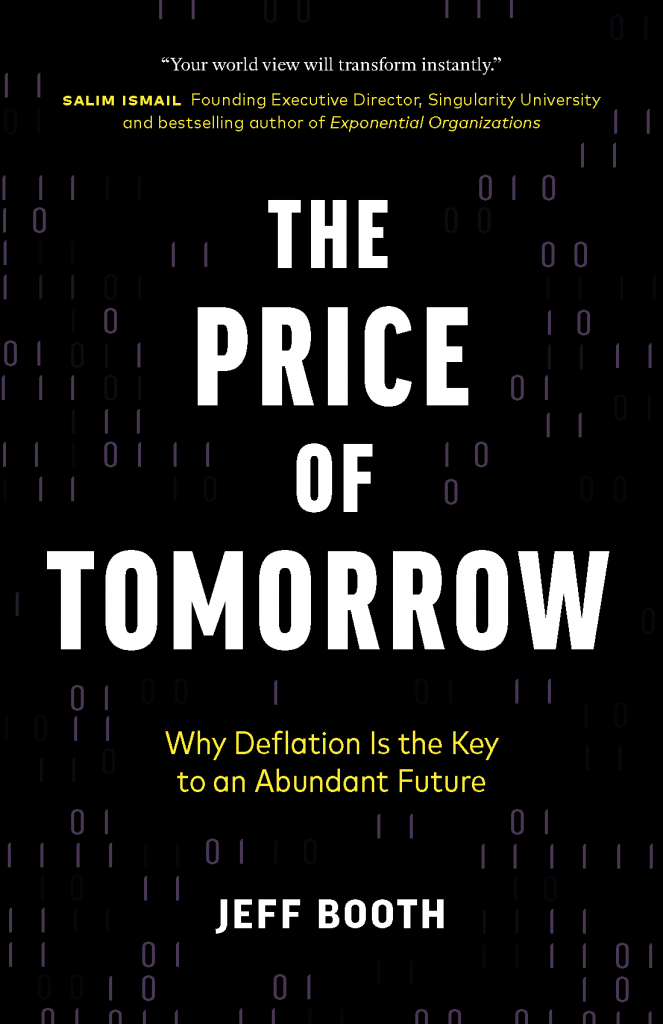
Jeff Booth is an entrepreneur, Visionary & Technology leader, Author, and Strategic Advisor who has started quite a number of different technology companies. He wrote a book published on 12th January 2020 called “The Price of Tomorrow – Why Deflation is Key to an Abundant Future” taking the readers through the effect of inflation and deflation are having in today’s societies. In it, Jeff offers his provocative thesis and views about the current state of our economies. He also discusses what we and our authorities have to enable for a brighter future.
Interview Date : 26th February 2021
- Jeff Booth (All Interviews)
- What made you write that book?
- Why is deflation the key to an abundant future?
- Why are politicians, economists, Bitcoiners, etc. all giving different explanations to inflation?
- Why is the government wanting to raise the prices?
- What could happen if the natural forces take over and the fed stops printing?
- How did technology deflation against government inflation start?
- Does it matter who is in political power now?
- What is the most recent technology that has become the biggest forest driving?
- Did going off the gold standard create our current situation?
- Why do other countries want to get off the dollar system?
- What can Bitcoin or the cryptocurrency space do, if anything?
- Are Banks going to set foot in space?
- What are the strengths and weaknesses of Bitcoin?
- Why are we against the force of technology?
- How can the value of money be destroyed?
- About Ethereum
- How can we pay attention to the bigger problem people eventually will face economically and socially as one society?
- Message to Japan
Jeff Booth (All Interviews)
What made you write that book?
Primarily my kids. The subject in the book was something that I was talking about for over 10 years, and people weren’t being able to put the 2 concepts of technology and deflation together. So, I realized I have to write this book.
Why is deflation the key to an abundant future?
Well, technology is deflationary. Technology provides so much efficiency that it creates deflation. If you look at your cellphone or just about anything technology-driven that you use, you get more for less on an exponential scale. That technology is moving into every single part of our world. So, you would expect prices to be falling as a natural by-product of that while saving our time. We should be getting more for less and have our time expanding, but it doesn’t feel like that’s happening. Governments are printing money to be able to make prices go up, however, the technology force, and I call it “a force for goods”, is fighting against an inflationary monetary policy where governments need to make prices go up. Those two forces are colliding against each other in the world today.
Why are politicians, economists, Bitcoiners, etc. all giving different explanations to inflation?
People are measuring their world in the base unit of the currency they are using. One of the topics I looked at in my book was “if my thesis was right, then prices should be falling”. Something over the last 20 years is blocking those prices from falling. What I found was that $185-trillion of an additional stimulus (debt) created over the last 20 years is what has been blocking it. Essentially, the currency units are being expanded to try to drive inflation in house prices, food prices, etc. against the natural forces.
Why is the government wanting to raise the prices?
They are trapped. Governments don’t want to raise the prices, but the entire economic system itself globally isn’t actually backed by anything. It’s backed by debt. So, if you allow deflation, that will keep on unwinding all the way to the ground getting people to realize there’s nothing there backing the economy. So, governments are trying to outrun that problem by driving inflation into it. However, they’re making the problem even worse by their activities, and you could confirm this even back in 2008. For example, we had letters of credit that were fully funded on this side of the ocean, but banks wouldn’t acknowledge or take them in Europe or China. The reason for that was the banks wouldn’t trust each other. So, why the US fed came in with $250 million of print for the system to get the trust going again as there wasn’t anything backing it. However, that was just more debt, and the number is getting bigger by the minute predictably because technology is moving the other way.
What could happen if the natural forces take over and the fed stops printing?
Unfortunately, if the government would let the natural forces take over today, everything would reset, including banks and governments. We would have a global depression that would be extremely severe, and that’s what governments are trying to stop. The only way to stop it from happening is by printing more, essentially concentrating all power of decision-making in governments and removing the free market.
How did technology deflation against government inflation start?
To me, it’s people who are caught in a second-order derivative of a first principle. The first principle is that technology changes the rules. And, technology is moving exponentially which in turn is, or should be, creating more and more deflation that governments print more in response to. Governments failed to recognize technology is moving so fast that people think they’re playing by the old rules. But the rules have already been rewritten. It is the same reason why Blockbuster didn’t see Netflix, or why Kodak, who invented the digital camera, didn’t see what the digital camera could do and what its power potentially could be in a different business model. Thus, most of the things we see around are a response to the exponential rate of technological progress, meaning that it is technology driving at all.
Does it matter who is in political power now?
It doesn’t matter who is in power. An actor in the system cannot change the system. Imagine you were in power, what would you do? So, they’re trapped into a set of actions because they worry about the short-term implications that could be so severe. They worry about doing the right thing on the other side. So, it’s not bad or ill-informed people are in power like many in the crypto space and other industries think. It’s a system chain across all systems that is broken.
What is the most recent technology that has become the biggest forest driving?
The technology forces are everywhere today, and most deflation is in front of us. For example, artificial intelligence is a horizontal technology that applies to every other technology and industry that is moving rapidly today. At one point in the future, artificial intelligence will be smarter than all humanity. That point could come in 50 years or 10 years, but time doesn’t matter because computers are going to be better at doing things than humans for free on the entire way there. So, it shows you the path we’re on in every single industry.
For example, the solar power industry was still more expensive than other power sources until recently. Now solar power is entering the grid at a lower cost, and that lower cost is bringing more and more energy in a cheaper fashion. Even though it is still a small part of the overall energy infrastructure, it is also expanding exponentially. But it is a deflationary force that can already start to be felt in the energy industry; the more energy into the grid, the more the prices will decrease and it will keep on going down. When the price of the solar panel electricity supply goes down, all of the other energy industries will have to go down in price too. If you follow that logic, you will find it in all industries. Most of the deflation is in front of us, and in response to that, governments are going to have to print more bulks of money. That printing is dividing society. It is inflation that is the upper side of the coin on wage deflation.
Did going off the gold standard create our current situation?
After World War, the gold standard was set to back the US dollar, and that restricted the US from printing massively. If they printed, then that share would have to be backed by gold. During the Vietnam War in the 1960s, the US tax rate was 90%. Thus, the government couldn’t tax their citizens anymore, and so they had to think of how to pay for damages the war was causing, their citizens, etc.
They decided to get off the gold standard and pay for it through inflation. However, inflation for the government is a hidden tax on the people who are most unable to pay. Because of assets the rich owners, the people who have their assets in houses stocks, etc., inflation made their wealth increase while it picked the pockets of the people that were most unable to pay through currency devaluation, and essentially wage deflation. So, the US went from the gold reserves to the petrodollar system, and they had energy or oil priced in US dollars. This gave the fed another ability to control the system back then that is breaking down currently.
Why do other countries want to get off the dollar system?
What ends up happening in a global currency is that everybody’s devaluing their currencies; if the dollar is devaluing, other currencies that are pegged or connected to it will also become devalued. If the dollar fails, no other country will suddenly say “I’m going to trust the Yuan now for global trade”. It’s unlikely to happen for any current currency because the rules of currencies can be manipulated by the government as we’ve seen through history. That is why countries like China and Russia have been buying gold to try to get their currencies backed by a gold standard.
What can Bitcoin or the cryptocurrency space do, if anything?
They are affecting the system already, specifically Bitcoin. It is transitioning the system by being a hard currency that cannot be manipulated. Our current situation is this: There are about $130-trillion of negative real interest rate bonds today, and every other economic calculation is on top of that $130 trillion. We’ve never had that amount of debt, and the people who believe the safest spot to store their money today is in the treasury bond are guaranteed to lose their money. That is on a good day, and we know it’s going to be a lot worse than that.
People in the Bitcoin and crypto system have started to realize that all the risk is in the system, which Bitcoin is outside of. This is making people trust Bitcoin as a store of value. The money flows are starting to move into Bitcoin making it gradually become less risky.
Are Banks going to set foot in space?
This is a giant opportunity and the problem because a system rarely does change what it needs to change. The change in a system comes from outside the system forcing a change in the system. When I wrote the book, I was hoping for a system change where we would realize “if prices were to fall along with the natural rate of technology, then we wouldn’t need the jobs to try to keep the prices going up forever because prices will continue to fall”. However, what I realized is that the system itself is not going to change it.
So, those changes are being imposed on the system from the outside, which is what Bitcoin is doing. I suspect over time, if it continues, that you could divide the world’s wealth by 21 million Bitcoin. If you measure our world in 21 million Bitcoin, you will realize everything that I’m talking about: we already live in a deflationary world, and everything gets cheaper every year.
What are the strengths and weaknesses of Bitcoin?
First, I think it could be humanity’s greatest invention. It sounds crazy to say that right now, but a lot of people would have questioned the printing press when it was developed too. What the printing press did was move information out so everybody could have access to information. Now, anybody could put their thoughts together and express themselves, thus humanity exploded because the printing press took away power from the very rich and gave it to everybody to be able to spread their ideas. And, the best ideas won. That’s what Bitcoin is doing for money and a whole host of other things. One day, we will look back on this convention and think “why didn’t we do this all along?”.
If governments would have turned off the printing press, everything would unwind and that would be pretty destructive for society. Eventually, you are going to have revolution and war if governments keep printing today. However, if you could slowly bleed out what the governments and central banks are doing into Bitcoin at a slow-enough pace and get enough people involved at the right time, you could transition from where we are to where we’re going more peacefully.
Why are we against the force of technology?
Imagine an alien drops from outer space today and asks “why aren’t you using technology to allow prices to fall?”. What answer do you have? It’s so ludicrous that we are married to a system where many people believe that prices have to always rise for us to survive. The entire point of technology is to reduce prices and give us more for less, so why don’t we allow that to happen? To me, it isn’t even an uncomfortable truth: it’s just the truth that has consequences for the existing system. But the existing system also has consequences in itself if you fail to recognize the truth.
How can the value of money be destroyed?
Money is an abstract for our time. It’s an agreement for a trade of our time. If I work for somebody for $20 an hour, I’ve made a trade for my time for $20 an hour. When you destroy the value of money, you destroy the value of my time. When you think about those terms, we should be thinking about “where do we get our time back?”. In the case of Bitcoin, nobody can destroy the trade of our time. So, Bitcoin is a forcing function that makes sure nobody can destroy that power of your time perspective.
About Ethereum
To me, Ether is not proven yet. It was not designed for the same function as a store of value like Bitcoin. It was more designed as a currency, it’s a currency, but it has a high cost for its function and purpose. Also, for the many changes that have gone through Ether, I don’t think it’s a stable platform that you can trust in any of those mediums yet. Maybe you can one day, but right now, Bitcoin has been proven as a store of value.
How can we pay attention to the bigger problem people eventually will face economically and socially as one society?
That’s why I do these podcasts, interviews and why I wrote the book. It wasn’t to try to make money, fame, or fortune out of it. I have very successful businesses and I love spending time with technology founders in creating special businesses. That’s something I love to do, and apart from that, I love spending time with my family and friends. I wrote the book in hope that it would work as a lightning rod to a conversation we need to have. People are having conversations that are too removed from the primary problem.
Let’s pay attention to this issue like an entrepreneur. When an entrepreneur sees a problem or a structure that’s broken, all their energy goes into fixing it. No energy goes into “what used to be”. All the energy goes into “how do I deliver this value?”. Even when the engineer hits a wall, they keep going until they deliver the value. When I think about how much energy is being consumed by the world in chasing past problems like slavery, ethnicity, cultural differences, byproducts of colonization, wealth disparity, etc., and making the matters worse instead of talking about the root issue and how we could transition to a better future, I shudder. That’s why I wrote the book. I hope that through podcasts, and my book, more people will start to talk about this. What I’m excited about right now is that people are carrying the torch of this conversation forward, and it’s impossible to put back. As Victor Hugo once said, “ Nothing is more powerful than an idea whose time has come”.
Message to Japan
Treat people who don’t understand the space and are just learning carefully and kindly. Once you understand the Bitcoin rabbit hole to the depth, it becomes really hard to face reality. You can’t believe why others around you aren’t seeing it, and that attitude pushes off a whole bunch of people from wanting to explore. The other thing is to always be curious and humble in asking yourself “what don’t you know” “what are you missing”, etc. to constantly dive deeper into the space.
Social: @JeffBooth | LinkedIn
Book: thepriceoftomorrow.com
Personal: jeffreybooth.com
Interviewer , Editor : Lina Kamada
【Disclaimer】
The Article published on this our Homepage are only for the purpose of providing information. This is not intended as a solicitation for cryptocurrency trading. Also, this article is the author’s personal opinions, and this does not represent opinion for the Company BTCBOX co.,Ltd.


